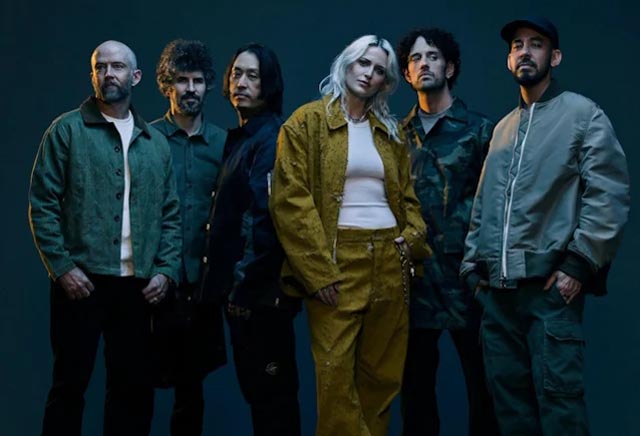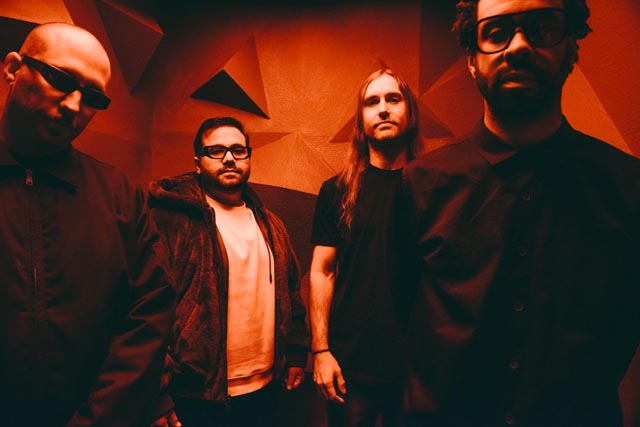Linkin Park is one of the most successful rock bands of the last 15 years. While serving as the band’s DJ, Joe Hahn has also been directing or co-directing the band’s videos since their first album. Now, he’s branched out into film, directing his first feature, Mall. The film, based on a novel by Eric Bogosian, was co-produced by and stars Vincent D’Onofrio, and is a character study about a group of people that are directly or indirectly involved in mall shooting. With the film in theaters on October 17th, we caught up with Hahn to discuss Mall, what got him into directing, and how he managed to do it in between his main gig.
How did you get attached to Mall, and were you familiar with the book?
Vincent and I have a mutual friend who is a producer on the film. He gave me the script previously and Vincent optioned it from Eric Bogosian. It was his novel and he co-wrote it with Sam Bisbee and Joe Vinciguerra. I think Vincent was going to direct it himself but Sam put us together and I had a bunch of ideas for it, and he said “you direct it and I’ll produce it.”
So you were friends with Vincent before?
No, we became friends through this project.
How long did it take you to find a first movie to direct? You’ve been directing videos for years.
Probably 15 years.
So it’s something you knew you wanted to do even when Linkin Park began?
For sure, I think directing and music are parallel things, where I can do both. They’re both creative expressions for communicating with an audience. Music plays a big part of film, so I try to incorporate the things I learned along the way with music videos.
You started out directing music videos. Was there a time where you thought you could direct a feature film or did you have to make videos and learn your craft before tackling something as ambitious as a movie?
I got comfortable with directing videos pretty quickly. I feel it’s a pretty natural process for me, and I think a feature is an extended process of that for me. On videos we have two days to shoot, and this film took us 18 days to shoot.
That’s not that long considering. Was there a point where you felt you were in over your head?
There were a few hairy moments here and there. I get those on videos too, when something doesn’t show up or you don’t have enough time for something. You have to dissect what’s going on and put the sequences together in your head, reevaluating what’s really important. That’s going on constantly.
Going back pre-Mall, what were some of your favorite videos you directed?
“Waiting for the End” was pretty cool. As abstract as it was, I think it conveyed a futuristic feel of where the world is headed to digitally, and being able to convey soul through that technique was really fun for me. “Breaking the Habit” was another cool one for me back in the day because I got to work with a Japanese animation studio. “Catalyst” was a fun one to do. It was dark but also celebratory at the same time, trying to find the light in the darkness.
Does the band inherently trust you when you come to them with a video idea?
Yes and no. Everyone is really smart in the band and more hyper-intelligent than the average group of six guys that are not in the tech world, so you get a lot of advantages too. You get micromanagement, and after a while you build trust. When the right idea resonates with everyone, can truly say it’s the right thing to do.
How are you able to sandwich directing a film with everything going on with the band? You just put an album out.
This [film] was really about finding the 18 days to shoot. We took a long time to do the post-production. It just worked out. There was a window of time when we were off the road. We did the pre-production, cast everyone, and got the right crew together, and found a mall to shoot at, and did it.
Was an existing mall or was it closed?
It’s an existing mall in New Rock, California, very close to where I grew up.
That must have been kind of cool.
Yeah, it doesn’t exist anymore but there used to be a Montgomery Ward but now it’s Target.
Of course it is! Are there any artists you look up to and emulate in directing music videos and ‘Mall’?
I don’t have a top ten per se, but I think every director especially directors that have been around for a while have redeeming qualities you can learn from. There are things they do consistently as a technique. You throw those things into your bag or hard drive, and you find moments to incorporate some elements of those things and put your spin on it, which I guess ends up being style, right?
Right! So no one in particular though?
Fincher, of course, is a great one. Some of the Steven Spielberg classics. Today I feel like you’re either really good or really bad. There are so many great movies coming out now that it’s almost like directors on steroids.
You said earlier that music and directing are really related, and I know that some members of the band worked on scoring the film. How musical was it to you? Explain the way that they work together, in your mind.
For instance, for the opening credits I had a specific song in mind that we wrote but didn’t exactly have a home for it. I always imagined this guy driving a car and just rocking out to this song. The title credits would just glitch in and out to what was going on rhythmically. I think music can reveal itself early or reveal itself later, so when we’re in the editing music we place temporary music, and sometimes when we put our music in it fits like a glove and it really spoke to me on so many levels, mainly to be a voice for that character. It’s such an additive element that the scene can’t live without that. We found some of those moments with some of our songs, and because of those moments we are able to create themes with those specific characters in the film.
Have you done film scoring before?
We were involved with some music placement, and for the Transformers films we would provide music and they would turn that into the scoring.
That was them?
We would work in conjunction with them. They were doing more of the music editing as far as placement and we would provide the inspiration and the tracks.
The theme of the movie is about a shooting?
That’s a catalyst for the events that unfold. It’s really about a young man trying to figure out his life. I think the tag on the film is “From noise comes chao,” which is a quote from Steppenwolf. There are a lot of references to Steppenwolf in the film. The film examines these five people who hang out at the mall. The mall traditionally, although changing today, has been an epicenter of therapy for someone to almost feel better, whether to buy something, to eat, walk around, or be visually stimulated. It’s a congregation of consumption turning into feeling better about yourself, but we all know that’s not the reality.
Malls are kind of going away too.
Yeah, now they’re more of family entertainment places. There are different characters in the film, and the main character focuses on them and is critical of them but is also smart at the same time. He is partially correct and partially being arrogantly judgmental. For the story, with the shooting that happens, a lot of things unfold in the story that gives reason for our main character Jeff to interact with these people who kept out of distance originally. Through each encounter, he realizes that he doesn’t want to be like any of them. He has to make those choices for himself. Before he gets to that, he gets to a point of an enlightened experience where he starts seeing life a little bit differently.
Given that there is a shooting in a movie and the actual incidents of gun violence that have happened during and after the filming and production, did it become a sensitive topic?
I had to think twice about everything. In conclusion, what I came up with for myself is this is reality. Now on the news they warn you that you might not want to watch this [news] because it can be graphically sensitive, but if you’re not aware of what’s going on, you’re kind of hiding. For me the story doesn’t really serve as a remedy. There’s no solution or preaching about anything. It’s portraying something through fiction that can and has happened. It encourages people to talk about it and be positive about it. The more people talk about it, the more they can have an understanding and come closer to a solution. Every case where this type of thing happens is different. By hiding from talking about something is not the way to address it in my opinion.
What’s next for you directorial wise?
No features are lined up yet. I’m reading a lot of stuff and developing a bunch of projects, but nothing yet.
Has anyone been like ‘Joe’s directing movies now’ and coming out of the woodwork pitching to you?
That’s starting to happen a lot now, but with the band we are really picky about the choices we make. I want to be really driven to do my next film because I want to be proud of what I do. It’s not to pay the bills. I already have another job for that.
In closing, I’ll give you an actor or actress you’d kill to work with?
Well, Vincent…
You already have him!
I can’t really ask for much more. I don’t really get star struck, but I get impressed by performances. With the Hollywood business, people get attached to projects because of the value that they carry. I guess it depends on what is in the script and who would be the best for it, and who would bring the most value. At the same time, I don’t like it when who the person is carries more weight than the person they are trying to portray.
That’s not a character, that’s Tom Cruise, or whatever.
He’s a great actor. You’re watching Tom Cruise, Denzel Washington, and Nicolas Cage, who are all great actors. I want to see great stories that are told in a visually captivating way, and I want to be able to tell those things.












